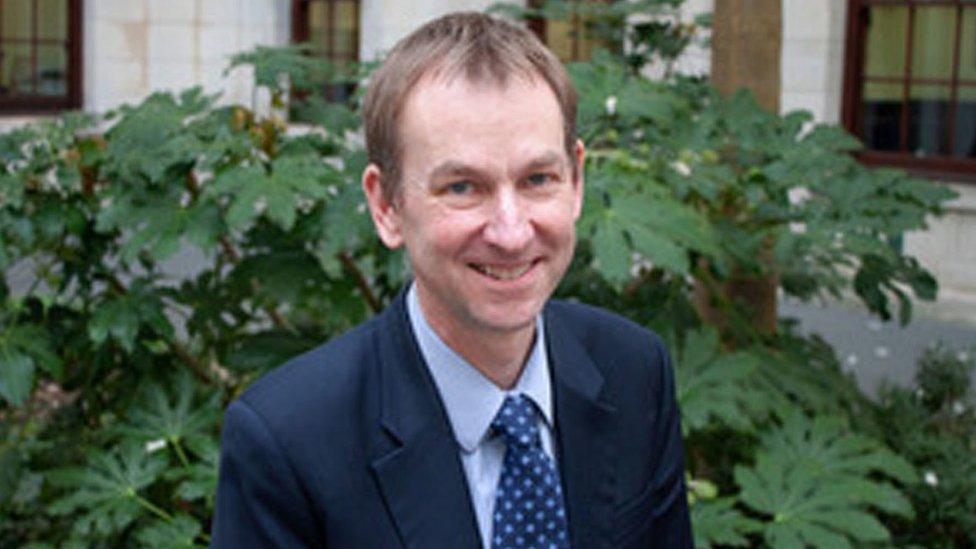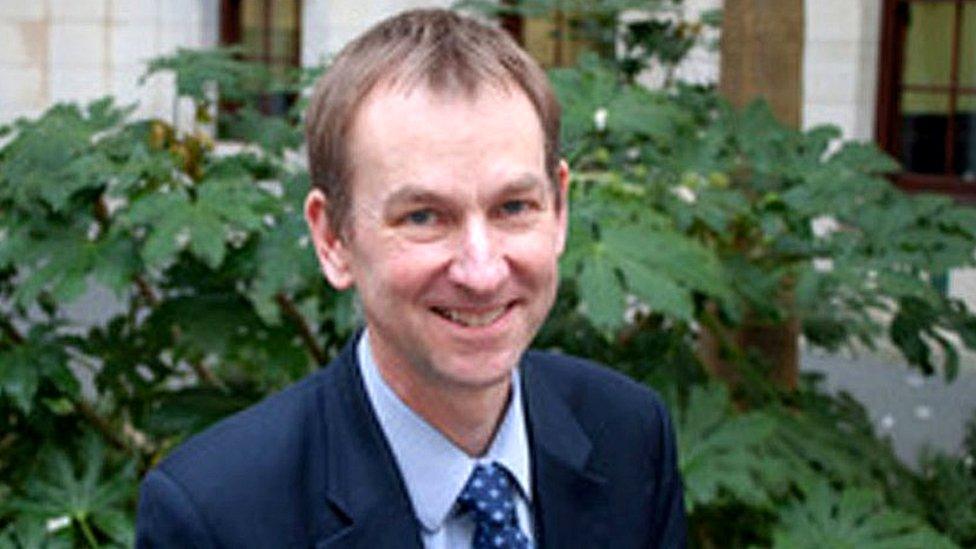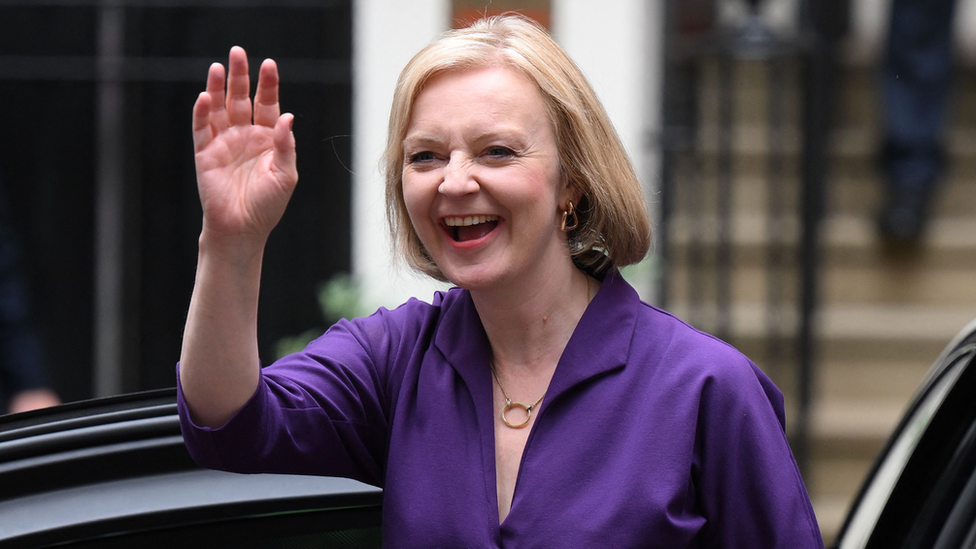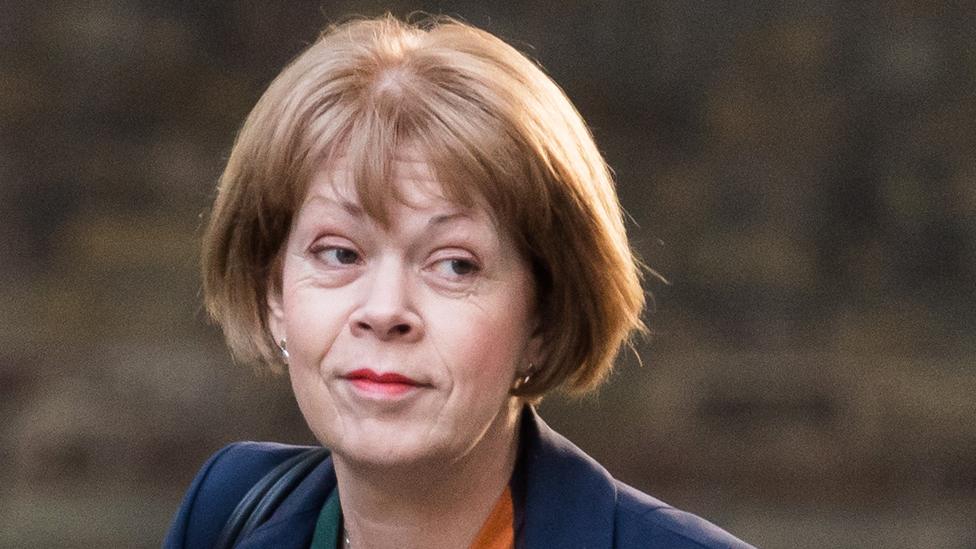Treasury boss Tom Scholar received £335k payout after sacking
- Published

Sir Tom Scholar had been the official in charge of the Treasury since 2016
The top official at the Treasury who was sacked days after Liz Truss became prime minister received an exit payout of £335,000.
Sir Tom Scholar was fired after Ms Truss pledged to change "Treasury orthodoxy" during the Tory leadership campaign last year.
His dismissal was criticised by former officials, who said it was an attack on the impartiality of the civil service.
At the time, the Treasury thanked Sir Tom for his "dedicated service".
The details of Sir Tom's severance payment for "loss of office" were included in the Treasury's annual report, external and accounts for 2022-23.
The figures show Sir Tom's total pay for 2022-23 was more than £550,000 ($700,000), including salary and pension benefits.
The Treasury's latest accounts also revealed the severance payments made to ministers during the 2022-23 period.
Ms Truss and her predecessor as PM, Boris Johnson, both received £18,660 after resigning, while the former Chancellor, Kwasi Kwarteng, was given £16,876.
Prime Minister Rishi Sunak received a payment of £16,876 after resigning as chancellor in July 2022, but later repaid this amount.
Severance payments of £7,920 were handed to three ministers, including Chris Pincher, who resigned as deputy chief whip in June 2022 over allegations he groped two men at a club in London.
The deputy leader of the Liberal Democrats, Daisy Cooper, called for the payouts to be given back, while Labour's deputy leader Angela Rayner said the former Tory ministers should not be "walking away with an enormous payoff".
Ministers are entitled to a "loss-of-office" payment amounting to a quarter of their ministerial salary if they leave their role and are not appointed to a new one within three weeks, providing they are aged under 65.
A government spokesperson said there are long-standing rules about what ministers are entitled to receive as severance pay. "Under those rules, it is for ministers to decide whether they wish to accept it," the spokesperson said.
Separately, government accounts showed that severance payments totalling £2.9m were paid to special advisers between April 2022 and March 2023, a period of political turmoil featuring three prime ministers.
Dismissal criticised
Large exit payouts to senior civil servants have proved controversial and Sir Tom's is higher than those handed out to other senior officials in recent years.
For example, the Department for Education handed former permanent secretary Jonathan Slater a £277,780 payout after he left in 2021.
A Treasury spokesperson said Sir Tom's payment was a "contractual amount resulting from the Civil Service Compensation Scheme - the payment is based on length of service and includes pension payments".
The Treasury says Sir Tom left his role as permanent secretary on 8 September, two weeks before the then-Chancellor Kwasi Kwarteng delivered a financial statement widely known as the mini-budget.
The mini-budget caused turmoil on the financial markets and after a period of political and economic turbulence, Ms Truss resigned as prime minister after 45 days in office.
James Bowler, who was appointed as the permanent secretary to the Treasury in October last year, told a committee of MPs that Sir Tom's departure "wasn't normal".
Mr Bowler said: "I think the then-chancellor of the exchequer said he didn't want Tom to continue as the permanent secretary, so Tom stood aside and the process was undertaken to appoint someone in his stead."
Sir Tom had served as the permanent secretary to the Treasury for six years before his sacking brought an end to his career in the civil service.
In a brief statement following his dismissal, Sir Tom said: "The chancellor decided it was time for new leadership at the Treasury, and so I will be leaving with immediate effect.
"It has been the privilege of my career to lead this great institution since 2016. I wish the Treasury all the best for the times ahead, and I will be cheering on from the sidelines."
Throughout her campaign to be Tory leader, Ms Truss blamed "Treasury orthodoxy" for slow economic growth over recent years.
Ms Truss, a former Treasury minister, accused her old department of promoting an "abacus economics" and insisted there needed to be a greater focus on stimulating economic growth.
She promised to boost the economy through "bold" tax cuts - a move that her leadership rival and successor as prime minister, Mr Sunak, predicted would stoke further inflation.
Ms Truss was ultimately forced to ditch her economic plan and quit as as prime minister after a Tory revolt sapped her of authority.
Related topics
- Published11 September 2022

- Published20 October 2022

- Published24 November 2022
